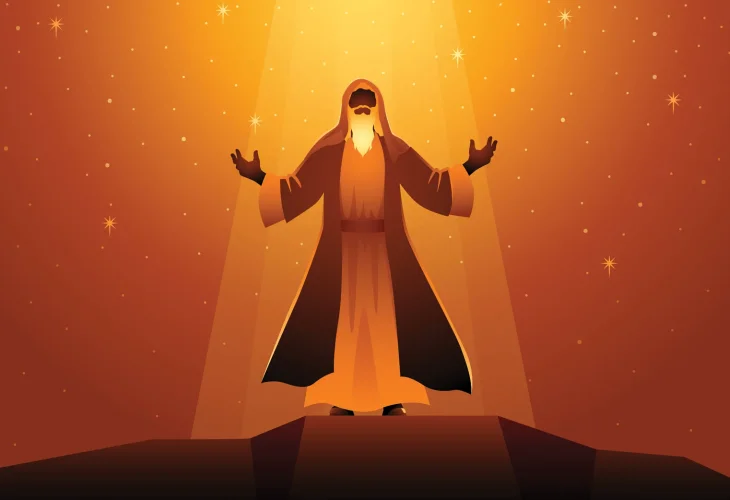The Spiritual Revolution: How One Idol Shop Sparked Change
Abraham rejected the idea of division, a concept that seemed undeniable to all of the world at his time, to which kings, priests, elders, and scholars were beholden.
 (Illustration: shutterstock)
(Illustration: shutterstock)Idolatry was the ancient science, developed by generations of professionals who observed nature. They understood that every place had a different character because specific forces controlled it. Why doesn't it rain in the Negev, while there are floods in the lowlands? Why are there swamps in Sharon? Why does the Nile flow in Egypt, yet between Canaan and the Jordan there's a great rift with hot springs? Clearly, these phenomena aren't random. There are special forces in each place taking responsibility and managing things. Indeed, the behavior of these forces isn't logical, but one doesn't question nature. The sages who tracked the behavior of locales knew which actions brought rain, dispelled diseases, and deterred predators. The fact was that lands following these rules thrived and bore fruit.
Humans felt that one thing set them apart from animals: their ability to command and act, to honor those forces governing parts of the world. Animals have a certain wisdom, but it's always practical. They build their homes, they hunt, but they understand nothing abstract. Even their relationship with masters, "The ox knows its owner and the donkey its master's crib," is practical, even when emotionally loaded, as seen with dogs. It's still practical, not abstract knowledge. Mankind's ability to grasp abstract ideas and perceive them as reality, no less than visible phenomena, led to the development of the 'science' of idolatry. It was the best explanation for the world's madness and chaos, attributed to the erratic behaviors of the gods. The gods weren't depicted as good or benevolent; on the contrary, stories about them involved quarrels, betrayals, murders, and madness. Their essence was learned by their priests from the nature around them.
Abraham was born in Haran. The names of his family members are known from ancient inscriptions in the region. Serug, Peleg, Nahor, Milcah, Haran, and Terah are all names found on inscriptions from the land of the great rivers. Some names are associated with moon worship, the primary worship in Haran. Even the name "Terah" resembles "Yareach" (the Hebrew word for moon).
Terah was of noble lineage, the ninth generation from Noah. Despite this, he didn't settle in one place but wandered from Ur to Haran with the intention of continuing further. He was already a Hebrew, deserving of this title as his ancestor Eber's descendant. The entire world was on one side, and he on the other, as a wanderer. He initiated Abraham's journey "to the land of Canaan," but remained pagan. Terah sold idols, which, while idol-related, was universal: his shop offered statues of various divinities. Terah wasn't bound to one god; he expanded his horizons by traveling, likely encountering many deities.
Abraham, a prince from a prominent and notable family, stemmed from nobility closely connected to Shem, Noah's son and his long-lived ancestors. As the Rambam notes, most descendants of the ten generations described as having "sons and daughters" didn't live long. Only the ten generations themselves were individuals of virtue who lived longer and, consequently, were far wiser and stronger than their peers.
Abraham refused the concept of division, an idea accepted globally at the time, that kings, priests, elders, and craftsmen scholars adhered to, like in Haran where the moon reigned supreme, and only sacrifices secured blessings, while another land catered to a different force.
Abraham saw a single power behind the universe, that the universe was indeed designed for humanity and aimed to bring blessings. All the world's curses result from sin. In his mind, young Abraham envisioned the world like Eden: rivers with abundant water, man working and guarding the garden. The soil produced endless fruit and vegetation, providing abundance for all. Even animals didn't prey, being satisfied by the Earth's bounty. This potential was real, could and did occur. The division we see is seemingly a false science, a sin's outcome. Could a father sacrifice his son for the moon's sake? What does the moon gain from this? That's not protection; it's a curse. The many wars in the name of various idolatries themselves are the curse. It's crucial to abandon these techniques of bringing blessings and turns, and directly approach the one power behind everything in the world, whose will is to bestow goodness upon us!
This idea was perceived as a dangerous heresy, even to Terah. Though Terah wasn't enslaved to the faith in Haran or strictly moon worship, his shop carried a full range of diverse deities. But to deny everything? To claim, "Our ancestors inherited nothing but lies"? Where does such audacity come from? And if this One God doesn't flood the earth with madness, what is He doing? What does He want from us?

